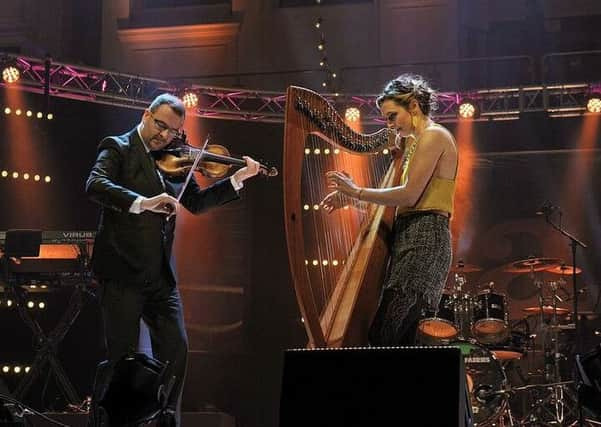Music reviews: Chris Stout & Catriona McKay/Ahlberg, Ek & Roswall | Tryst/Connla


Chris Stout & Catriona McKay/Ahlberg, Ek & Roswall *****
New Auditorium, Glasgow Royal Concert Hall
Tryst/Connla *****
New Auditorium, Glasgow Royal Concert Hall
A warmly irresistible, labour-of-love delight shone through the music of Emma Ahlberg (fiddle), Daniel Ek (guitar) and Niklas Roswall (nyckelharpa), individually ranked among Sweden’s finest traditional instrumentalists.
Advertisement
Hide AdAdvertisement
Hide AdTheir magically lush, buoyantly rhythmic new versions of venerable tunes – chiefly highlighting the bewildering diversity of that country’s dominant polska form, but also interwoven with graceful baroque elements – thoroughly captivated the show’s sellout crowd. After the interval, the über-dynamic duo of Shetland fiddler Chris Stout and Dundee-born harpist Catriona McKay delivered another dazzling display of less-is-more artistry, each in rapt, indivisible communion with their instrument and one another’s playing.
As with Ahlberg, Ek & Roswall, the lovely acoustics of the Concert Hall’s loftily proportioned new RSNO auditorium supplied the perfect setting for this aural cornucopia, as the pair’s largely original material – much of it destined for their upcoming third duo album – swept the gamut of styles and moods from a hauntingly stark, spacious slow air to densely layered, fiendishly complex workouts.
Same time, same place, the following night saw another full house for the debut by Tryst, a line-up of ten top Scottish pipers, premièring specially-written music by each player in turn, adapting the ceremonial, commemorative and meditative traditions of classical piobaireachd to a 21st century context.
The composers’ themes ranged from the plight of refugees to Highland land-rights campaigns; the excesses of consumerism to the importance of home, while the resulting five-minute pieces capitalised fully and thrillingly on contemporary developments in bagpipe technique and repertoire, complemented in several cases by artfully deployed electronic beats and samples.
With more than half of the performers doubling periodically on other instruments – including whistles, keyboards, guitar and accordion, as well as canntaireachd vocals – the arrangements were as varied as the compositions themselves, while all sharing in the central, utterly compelling majesty of massed, masterfully deployed Highland pipes, at once viscerally primal and stunningly sophisticated.
Opening the show, the young Armagh/Derry five-piece Connla made the most of their festival debut with a winningly vivacious, artfully accomplished set, combining classic Irish instrumentation – uilleann pipes, harp, flutes, whistles, bodhran and guitar – with Ciara McCafferty’s potently alluring, intensely emotive vocals.
Again, strong original material featured prominently, together with a rhythmic tautness and attack at times reminiscent of Flook – although it was a cover version that earned their last and loudest applause, as they finished off with an unexpectedly effective reworking of Eric Clapton’s Layla, its unmistakable guitar lick rendered instead by Conor Mallon’s pipes.